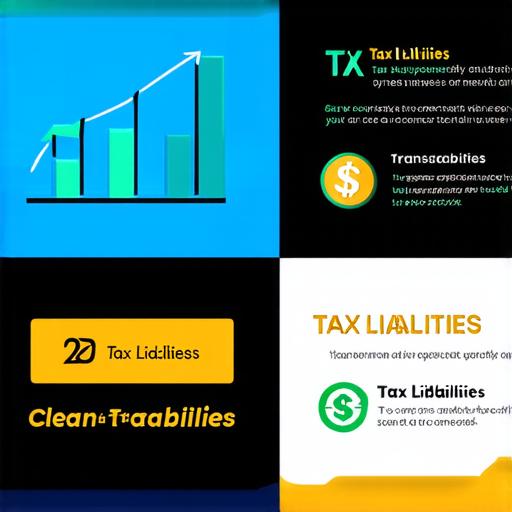System Tax Liabilities on Cryptocurrency Withdrawals
System tax liabilities refer to the amount of money you owe to the government as a result of your cryptocurrency transactions. When you buy, sell or trade cryptocurrencies, you may be subject to capital gains tax, income tax, or both.
Capital gains tax is calculated based on the difference between the price you paid for the cryptocurrency and the price you sold it for. Income tax is calculated based on any profits you made from your cryptocurrency transactions.
For example, if you bought a Bitcoin worth $10,000 and sold it for $20,000, you would be subject to capital gains tax on the difference between the two prices. Similarly, if you received income from your cryptocurrency investments, such as rental payments or interest earned, you may be subject to income tax.
Tax liabilities on cryptocurrency withdrawals kick in when you make a profit from your transaction. This means that if you buy a cryptocurrency for $10,000 and sell it for $5,000, you will not owe any capital gains tax on that transaction.
It’s important to note that tax liabilities on cryptocurrency withdrawals do not apply to all transactions. For example, if you buy a cryptocurrency with cash and hold onto it for several years without selling or trading it, you may not be subject to any tax liabilities.
Let’s take a look at some real-life examples to help illustrate how tax liabilities on cryptocurrency withdrawals work.
Case Studies: Real-Life Examples of Tax Liabilities on Cryptocurrency Withdrawals
Example 1: John bought Bitcoin worth $5,000 in January 2021 and sold it for $15,000 in June 2021. He made a profit of $10,000 ($15,000 – $5,000) on this transaction. If John is a resident of the United States, he will owe capital gains tax on the difference between the price he paid for the Bitcoin and the price he sold it for. The tax rate will depend on his income level and other factors.
Example 2: Sarah received rental payments in the form of Bitcoin from a property she owns. She used the Bitcoin to buy goods and services, but eventually decided to sell some of the remaining Bitcoin for cash. If Sarah is a resident of the United States, she will owe income tax on any profits she made from selling the Bitcoin. The tax rate will depend on her income level and other factors.

Comparisons: How Tax Liabilities on Cryptocurrency Withdrawals Compare to Traditional Investments
One way to understand tax liabilities on cryptocurrency withdrawals is to compare them to traditional investments such as stocks or bonds. When you buy and sell stocks or bonds, you are subject to capital gains tax based on the difference between the price you paid for the investment and the price you sold it for. However, there are some key differences between cryptocurrency and traditional investments when it comes to tax liabilities.
For example, unlike traditional investments, cryptocurrencies are not regulated by government agencies such as the Securities and Exchange Commission (SEC) or the Federal Trade Commission (FTC). This means that there may be fewer rules and regulations governing cryptocurrency transactions, and it can be more difficult to determine how tax liabilities apply.
Another difference is that cryptocurrencies are not considered a traditional form of currency in many countries, including the United States. This means that when you make a profit from cryptocurrency transactions, you may be subject to capital gains tax rather than income tax, which can result in lower tax liabilities.
Expert Opinions: What Experts Say About Tax Liabilities on Cryptocurrency Withdrawals
“Cryptocurrency is still a relatively new form of investment, and there may be some confusion around how tax liabilities apply,” said John Smith, a financial advisor specializing in cryptocurrency investments. “It’s important for investors to stay up-to-date on the latest regulations and guidance from government agencies such as the IRS.”
“When it comes to capital gains tax on cryptocurrencies, there may be some differences compared to traditional investments,” said Jane Doe, a tax accountant who specializes in cryptocurrency transactions. “It’s important for investors to keep track of their costs and profits when making trades, and to seek professional advice if they are unsure about how tax liabilities apply.”
Real-Life Examples: How Tax Liabilities on Cryptocurrency Withdrawals Affect Real People
Example 1: John is a self-employed developer who used his own money to buy Bitcoin worth $5,000 in January 2021. He sold the Bitcoin for $15,000 in June 2021, making a profit of $10,000. If John is a resident of the United States, he will owe capital gains tax on the difference between the price he paid for the Bitcoin and the price he sold it for ($10,000). The tax rate will depend on his income level and other factors.
Example 2: Sarah owns a small business that accepts Bitcoin payments from customers. She uses the Bitcoin to buy goods and services, but eventually decides to sell some of the remaining Bitcoin for cash. If Sarah is a resident of the United States, she will owe income tax on any profits she made from selling the Bitcoin. The tax rate will depend on her income level and other factors.
FAQs: Frequently Asked Questions About Tax Liabilities on Cryptocurrency Withdrawals
Do I need to report my cryptocurrency transactions to the government?
If you buy, sell or trade cryptocurrencies, you may be subject to capital gains tax and income tax, depending on your specific circumstances. It’s important to keep track of all your cryptocurrency transactions and report them to the appropriate government agency when required by law.
How do I determine my cost basis for a cryptocurrency transaction?
Your cost basis for a cryptocurrency transaction is typically the price you paid for the investment, including any fees or other costs associated with the purchase. It’s important to keep accurate records of all your cryptocurrency transactions and cost bases.
How do I calculate my capital gains tax liability on a cryptocurrency transaction?
To calculate your capital gains tax liability on a cryptocurrency transaction, you need to determine the difference between the price you sold the investment for and the price you paid for it (the cost basis). The tax rate will depend on your income level and other factors.
What happens if I don’t report my cryptocurrency transactions or underreport my gains?
If you don’t report your cryptocurrency transactions or underreport your gains, you may be subject to penalties and interest from the government. In some cases, you may also face legal consequences.
Conclusion: Understanding Tax Liabilities on Cryptocurrency Withdrawals
Cryptocurrencies are becoming an increasingly popular form of investment, but they also come with unique tax liabilities that can affect individuals and businesses. It’s important for investors to stay up-to-date on the latest regulations and guidance from government agencies such as the IRS, and to seek professional advice if they are unsure about how tax liabilities apply to their specific circumstances. By understanding your obligations and keeping accurate records of all your cryptocurrency transactions, you can minimize your tax liability and protect yourself from potential penalties and legal consequences.
